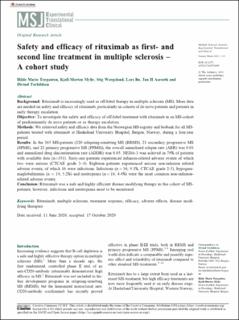Safety and efficacy of rituximab as first- and second line treatment in multiple sclerosis – A cohort study
Torgauten, Hilde Marie; Myhr, Kjell-Morten; Wergeland, Stig; Bø, Lars; Aarseth, Jan Harald; Torkildsen, Øivind
Journal article, Peer reviewed
Published version

Åpne
Permanent lenke
https://hdl.handle.net/11250/2766925Utgivelsesdato
2021-01-31Metadata
Vis full innførselSamlinger
- Department of Clinical Medicine [2066]
- Registrations from Cristin [9791]
Originalversjon
Multiple Sclerosis Journal, Experimental, Translational and Clinical. 2021, 7 (1), 1-10. 10.1177/2055217320973049Sammendrag
Background
Rituximab is increasingly used as off-label therapy in multiple sclerosis (MS). More data are needed on safety and efficacy of rituximab, particularly in cohorts of de novo patients and patients in early therapy escalation.
Objective
To investigate the safety and efficacy of off-label treatment with rituximab in an MS-cohort of predominantly de novo patients or as therapy escalation.
Methods
We retrieved safety and efficacy data from the Norwegian MS-registry and biobank for all MS-patients treated with rituximab at Haukeland University Hospital, Bergen, Norway, during a four year period.
Results
In the 365 MS-patients (320 relapsing-remitting MS (RRMS), 23 secondary progressive MS (SPMS), and 22 primary progressive MS (PPMS)), the overall annualized relapse rate (ARR) was 0.03 and annualized drug discontinuation rate (ADDR) was 0.05. NEDA-3 was achived in 79% of patients with available data (n=351). Sixty-one patients experienced infusion-related adverse events of which two were serious (CTCAE grade 3–4). Eighteen patients experienced serious non-infusion related adverse events, of which 16 were infections. Infections (n = 34; 9.3%, CTCAE grade 2-5), hypogammaglobulinemia (n = 19, 5.2%) and neutropenia (n = 16; 4.4%) were the most common non-infusion-related adverse events.
Conclusion
Rituximab was a safe and highly efficient disease modifying therapy in this cohort of MS-patients; however, infections and neutropenia need to be monitored.
